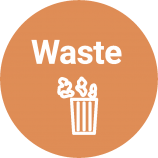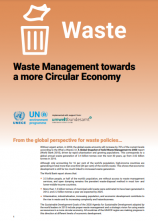Introduction:

There has been progress achieved in ensuring sustainable consumption and production patterns, nevertheless, further efforts should be taken towards meeting the UN Agenda 2030 Global Goals for Sustainable Development in this field.
One of the capacity-development webinars withing the framework of the UNDA project focused on the waste management indicators and policies, including reporting towards SDG 12. In this respect, the pan-European perspectives on SDG 12 on Sustainable Consumption and Production, with focus on waste management, the effectiveness of European waste management policies (within a circular economy under the EU Green Deal), guidance on national waste management related SDG indicators, and regional monitoring of e-waste in relation to policy assessment were on the webinar’s agenda. Austria, Armenia, Bosnia and Herzegovina, Georgia, North Macedonia, Kazakhstan, Kyrgyzstan and Tajikistan shared with the meeting their national experiences in the waste-management related targets and indicators for SDG 12 ( target 12.4: By 2020, achieve the environmentally sound management of (...) all wastes throughout their life cycle (...); target 12.5: By 2030, substantially reduce waste generation through prevention, reduction, recycling and reuse). To finalize the discussion, the participants expressed their viewpoints on the further development of the waste-management area. It was concluded that waste management policies in target countries are oriented toward resources efficiently, reduces waste, disposes safely toxic waste and pollutants. Implemented waste policy and strategy are in line with SDG.
Waste management indicators and policies – SDG 12
Thematic Overview

- Waste Monitoring and Data Management
-
Introduction
Waste monitoring and data management are important elements for the waste management. In all target, countries, waste data collection and management system for reporting by the main stakeholders in the waste management area are established or in a process of ongoing improvement. Policy relevant indicators are introduced in line to the SDG indicators as well including national recycling rate (Bosnia and Herzegovina) and specific targets for management of hazardous waste and targets for recycling of packaging waste, Waste Electrical and Electronic Equipment (WEEE), waste batteries, End of Life Vehicles (EoLV), tires. The national statistic offices and the Ministries of Environment are responsible for data reporting, monitoring, control and analytical activities.
Identified challenges
Deploying high-quality waste monitoring and data management systems require considerable efforts at national and international levels. During the webinar, the following challenges have been identified:
- Need of update of legislation on waste reporting
- Development of information system for online gathering current and accurate data and information for the quantity, type, treatment of the different waste streams.
- Update and extend existing Waste Data and Information Management system.
- Need of development of rulebooks for reporting of different waste streams for all stakeholders including WEEE.
- Undertaking measures for education and implementation of campaigns for increasing public awareness for treatment of waste and data reporting.
- Awareness raising to the obligated stakeholders for data reporting.
- Need of more reliable statistical information system by improving the cooperation between the various organizations collecting statistical information.
For more information, please see the presentations of European Environment Agency, UNEP, United Nations University, Armenia, Austria, Bosnia and Herzegovina, Georgia, Kazakhstan and North Macedonia
Good practices
North Macedonia In order to follow the current situation or changes over years in many aspects of generation and management with the different streams of waste, specific indicators on circular economy progress was developed:
Recycling rate of municipal waste for monitoring the waste management hierarchy and monitoring on the principle of circular economy.
North Macedonia Bosnia and Herzegovina In Bosnia and Herzegovina Within "Smart Growth", indicator have been selected - 12.5.1 National recycling rate, tons of material recycled Bosnia and Herzegovina Georgia
Information system for placed on the market different products was introduced as part of the information system for control and monitoring of waste streams under EPR and targets for recycling which for the most of waste streams are calculated as percentage from placed on the market products. Georgia Kazakhstan
In 2018, an interdepartmental working group was created "Planet" in the framework of the Goals Coordination Council sustainable development.
• The main directions of the RG "Planet": rational use of terrestrial ecosystems and water resources, climate change (SDG 6, 12, 13, 14, 15).
• The purpose of the WG "Planet" is to consider and develop proposals for the formation of a unified policy on implementation of the SDGs in the Republic of Kazakhstan
Kazakhstan Austria
Electronic Data Management (EDM) System:
- supports the competent authorities in Austria in their enforcement duties by providing specific, up-to-date information, e.g. on selected notifications, selected notifiers or selected transports
- generates comprehensive information, mainly on waste management operations
- provides basic date in order to fulfil reporting obligations
Austria
For more information, please see the presentations on the right -
National/international reporting (including for SDG indicators)
-
Introduction
Data reported to the Waste Information Systems are employed for monitoring on National level and, International level (including in terms of SDG indicators). In all project countries, targets for recycling and collection have advanced to a main political instrument towards considering waste as a resource and are introduced in the legislation and strategic documents.
Legislation on national waste data reporting is introduced in all countries, as well obligation for gathering data by main stakeholders and which data they need to report. In most of the countries national reporting is performed trough web-based information systems.Identified Challenges
The main challenges that have been reported by the countries in terms of the national or international reporting are the following:
- Need of improvement of national reporting
- Insufficient data on generated waste including WEEE and packaging.
- Development of information system for on line gathering current and accurate data and information for the quantity, type, treatment of the different waste streams.
- Need of implementation of better source separation and treatment technology for improvement of overall situation and increasing of resource efficiently
- Need of better coordination mechanisms.
- EPR Implementation for facilitating measure for improvement both of product policy and Waste Management and ensuring high quality data on specific waste
- Need of guidance and training on SDG
- Harmonization of the reporting for easy reporting to the international institutions.
For more information, please see the presentations of UNEP and United Nations University, and the final report of the UNEP-UNU/UNITAR-ITU project on the Regional E-Waste Monitor for the CIS+ region (which covered 5 out of the 7 UNDA project beneficiary countries: Armenia, Georgia, Kazakhstan, Kyrgyzstan, and Tajikistan).
- Approach to Public Waste Information (including the availability of disaggregated data)
-
Introduction
Waste information, made available to the public, is part of the first “pillar” of the UNECE Aarhus Convention (“(Public) Access to Environmental Information”), to which the project countries Armenia, Georgia, Kazakhstan as well as Austria are parties as original signatories, and Bosnia and Herzegovina, North Macedonia, Tajikistan as well as Kyrgyzstan have accepted it (status October 2021). However, the successful implementation of the Aarhus Convention in terms of waste information is based on the general availability of waste data in the data collection systems in the project countries, including the availability of disaggregated data.
Identified challenges
In most target countries, citizens are not yet sufficiently informed on separate collection and recycling, and the benefits of using waste as resources.
Good practices
Georgia
Waste Information System with public access developed and implemented in 2020 Georgia Bosnia and Herzegovina In October 2016, the UN in Bosnia and Herzegovina launched ‘Imagine2030’ (Zamisli 2030) an umbrella initiative to advocate, promote and engage citizens with the SDGs and to create a consultation tool for them (Oprašić, 2016). Bosnia and Herzegovina’s actions towards SDGs with an environmental dimension focus on SDGs 6, 12, 13, 14 and 15. Bosnia and Herzegovina submitted a Voluntary National Report to the UN in 2019. Bosnia and Herzegovina
For more information, please see the presentations on the right - Data Use for Environment and Health Policies
-
Introduction
Relevant resource efficient policy need well establishes system of indicators and data management for monitoring of policy implementation. Data reported to the Information Systems are employed for monitoring as well as developing Environment and Health Policies on National level (including in terms of SDG indicators).
Project countries are in different stages of policy implementation, but all efforts are directed to set up well functioning system for data management that can be used for policy assessment.
Need of improvement of different aspect of management system technical, financial, investment was reported by the countries.Identified challenges
For more information, please see the presentations on the rightGeorgia
- EPR Implementation and Waste Management Data
- Environmentally sound Management Technology for Recycling
- Municipal waste separation at source (recyclable and biodegradable) and tariff policy for municipal waste management (based on the polluter pays principle)
- Awareness raising
Georgia Bosnia and Herzegovina Key recommendations of the Reform Plan include:
- Need of setting up of a reliable statistical information system by improving the cooperation between the various organizations collecting statistical information
- Need of Improvement of the waste collection coverage from 67% up to 85-90% by renewing and extending the collection fleet;
- Need of further harmonisation of legislation with EU Directives meeting the affordability principle and strengthening the enforcement of its implementation;
- Need of reduction of cost increases as a result of shifting up in the waste hierarchy by creation of more efficient waste collection systems based on regionalization and reducing the costs for waste collection companies
Bosnia and Herzegovina

